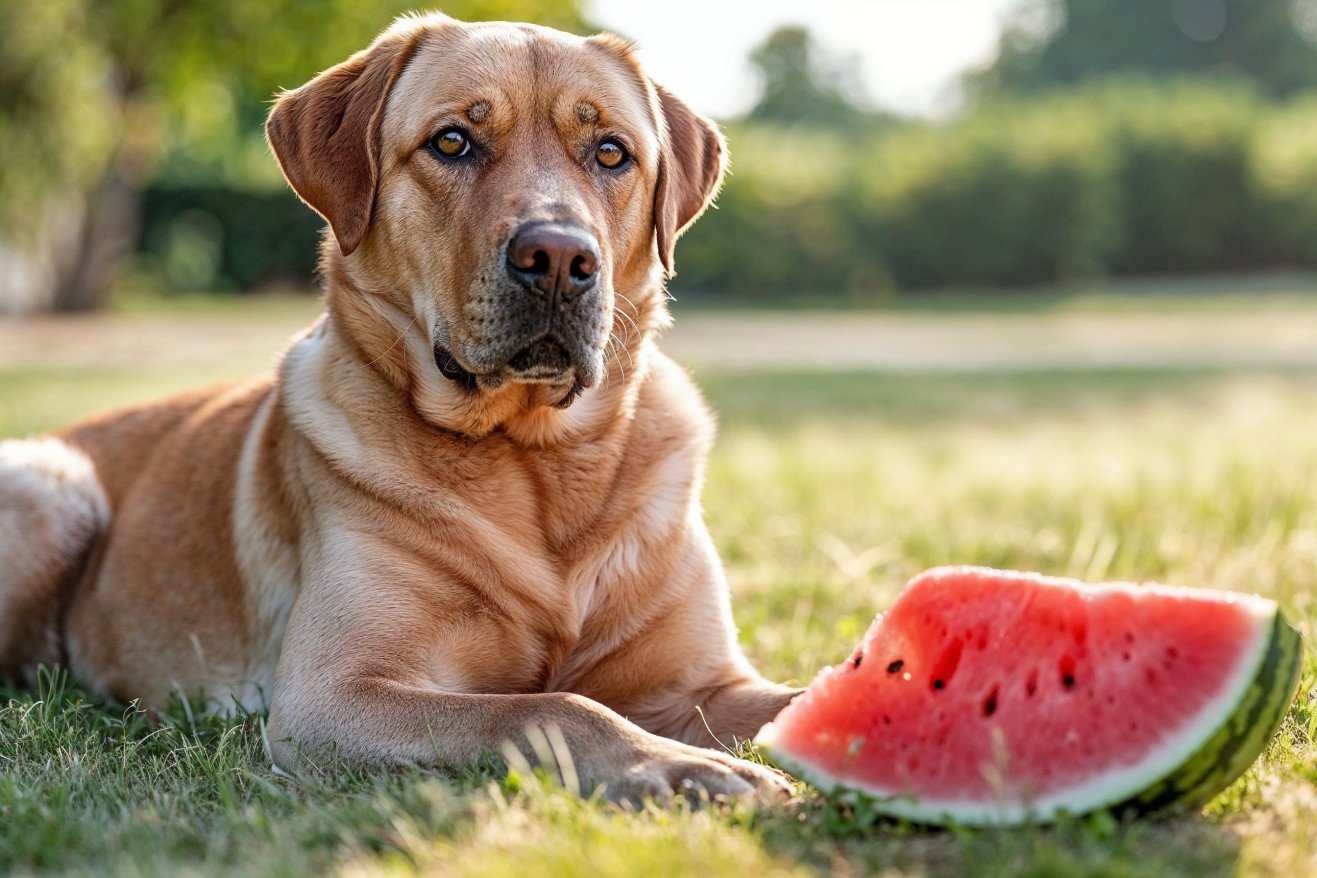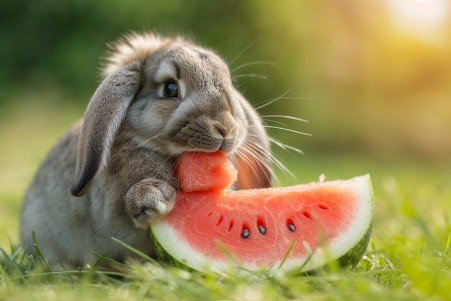Can Dogs Eat Watermelon? A Healthy Treat Guide for Your Pup
23 January 2024 • Updated 28 January 2024

With summer on the horizon, many dog parents are wondering if their pups can have some watermelon. The answer is yes, dogs can eat watermelon as a healthy treat. However, it’s important to make sure you’ve removed the seeds and the rind to avoid choking and other digestive issues.
Watermelon should also be given in moderation because of its sugar content, and you should always check with your vet if your dog has any health concerns.
This article will discuss the health effects of giving dogs watermelon from a veterinary perspective and a nutritional standpoint. It will cover the pros and cons, including studies that have been done on the impact of natural sugars and the dietary considerations you should keep in mind.
By the end of this article, you’ll know how to add watermelon to your dog’s diet in a way that’s safe and healthy, ensuring that you’re not only giving them a delicious treat but also one that’s good for them.
Can dogs eat watermelon as a healthy treat?
Watermelon’s Nutritional Benefits for Your Dog
In addition to being a great way to cool down, watermelon is also a great way to feed your dog. Watermelon is made up of about 92% water, so it’s a great way to keep your dog hydrated, especially in the summer months. The American Kennel Club explains that watermelon is also packed with vitamins, including A, B6, and C, which are important for your dog’s immune system, skin, and more.
In addition, watermelon is low in calories and fat, so it’s a healthy treat. According to HillsPet, watermelon is a good source of potassium and vitamin C, as well as vitamins A and B6, without the risk of weight gain. Plus, BeChewy notes that the fiber in watermelon can help with digestion and keep your dog’s digestive system moving.
That said, it’s important to remember that watermelon should be fed to your dog in moderation. Even healthy treats should only make up a small portion of your dog’s diet to ensure they get a well-rounded diet and don’t get too much of any one nutrient.
That said, with its vitamins, minerals, and hydrating properties, watermelon can be a great addition to your dog’s diet as long as it’s prepared and fed safely and in moderation.
How to Safely Feed Watermelon to Your Dog
As with any food, proper preparation is important when feeding your dog watermelon. Make sure to remove all seeds and the rind before giving your dog watermelon to avoid the risk of an intestinal blockage or an upset stomach.
HillsPet recommends using seedless watermelon or removing the seeds yourself. Also, make sure to adjust the serving size based on your dog’s size and diet, making sure to follow the American Kennel Club’s recommendation that no more than 10% of your dog’s daily calories come from treats.
If you want to mix things up, you can also serve watermelon as a frozen treat. The American Kennel Club recommends cutting the watermelon into small pieces or pureeing it and then freezing it to make a refreshing snack that your dog will love, especially in the summer.
However, it’s important to stay away from watermelon-flavored products that contain artificial flavors. These products can be toxic and don’t offer the same nutritional value as real watermelon. By following these basic steps, you can make sure that watermelon is a safe and fun treat for your dog.
Watermelon Warnings: Dangers of Dogs Eating Watermelon
Although watermelon can be a refreshing snack for dogs, there are some dangers to be aware of. Most notably, the black seeds can lead to choking and gastrointestinal blockages, and the rind can cause a blockage due to its fibrous texture. Canine Journal explains that the white seeds are less likely to cause a blockage but can still cause an upset stomach, while the black seeds are more likely to cause a blockages.
The natural sugars in watermelon can lead to weight gain if consumed in large amounts, even though they aren’t toxic in small amounts. Overeating watermelon can also lead to an upset stomach, as shown in a study on the dietary habits of dogs. In addition, although it’s uncommon, some dogs can be allergic to watermelon, leading to symptoms like hives and ear swelling, according to Wag Walking.
As with any new food, you should introduce watermelon into your dog’s diet slowly. Watch for signs of an upset stomach or an allergic reaction, and talk to your vet before making any major changes to your dog’s diet.
To make sure that your dog has a safe and positive experience with watermelon, make sure to prepare it properly and feed it in the right portion sizes. If you follow these precautions, you can feed your dog watermelon without compromising the principles of a balanced diet.
Watermelon Can Be a Healthy Dog Treat
In the world of dog nutrition, treats are a unique category of food. They are not only occasional snacks but can also be sources of important nutrients and hydration. VCA Animal Hospitals’ recommendation to think of watermelon as a treat instead of a dietary staple underscores the importance of a well-rounded diet.
This is also in line with the 90/10 rule, which says that treats, including watermelon, should account for no more than 10% of a dog’s daily caloric intake so that the rest of their diet can be made up of a well-balanced, high-quality dog food.
As noted by PetMD, a diet that meets the Association of American Feed Control Officials (AAFCO) guidelines, which includes a balance of proteins, fats, carbohydrates, vitamins, minerals, and water, is helpful. Watermelon can be part of this mix by providing vitamins A, B6, and C and fluids, but not too many calories.
It can be used as a topping for regular dog food or included in homemade dog treats to ensure that your dog’s diet is nutritious and interesting.
When you add treats like watermelon to your dog’s diet, it’s important to do so in a way that takes their overall nutritional needs into account. A veterinarian can work with you to create a feeding plan and diet that includes watermelon and other treats in a way that supports your dog’s well-being.
Fruitful Options: Healthy Watermelon Dog Treat Alternatives
When it comes to dog treats, it’s important to keep things interesting for your furry friend. For example, PetMD explains that apples, which are full of fiber and vitamins A and C, are a crunchy option to watermelon.
Apples are especially good for dogs that are active because they are full of antioxidants. Bananas are another option that can be good for dogs with sensitive stomachs because they are low in calories and high in potassium.
Blueberries are full of antioxidants and phytochemicals and are a great low-sugar option for those looking to help support their senior dog’s cognitive function. Blackberries and raspberries are also recommended by PetMD and are safe for dogs to eat in moderation and have the same benefits as blueberries with fewer calories.
It’s important to think about your dog’s health, age, and activity level when choosing treats. For example, pears are full of fiber and can be good for dogs with digestive issues, while peaches can be hydrating and good for dogs with digestive issues, according to PetMD.
It’s also important to make sure that you remove seeds or pits from the fruit to avoid choking or blockages and to talk to your vet about the best treats for your dog’s specific dietary needs, especially if your dog has diabetes or is overweight.
By offering a variety of safe fruits as treats, you can ensure that your dog’s diet is both interesting and nutritious, while also providing the hydration and vitamins that watermelon can offer.
Conclusion: Watermelon Can Be a Healthy Treat for Dogs
In summary, when fed correctly, watermelon can be a healthy and tasty snack for your dog. This fruit is packed with vitamins A, B6, and C, and potassium, all of which can help support your dog’s overall health.
That said, it’s important to remember that watermelon should be fed in moderation. According to PetMD, treats like watermelon should make up no more than 10% of a dog’s daily caloric intake, with the other 90% coming from a nutritionally complete dog food.
In addition, the seeds and rind should be removed to avoid the risk of choking or an intestinal blockage, and new treats like watermelon should be introduced in small amounts to make sure your dog doesn’t have an adverse reaction.
It’s also important to note that every dog is different and has different dietary needs. Therefore, it’s always a good idea to talk to your vet before feeding your dog watermelon or any other new food. This will help ensure that your dog’s diet is tailored to their specific needs, taking into account any health issues or dietary restrictions they may have.
As pet parents, it’s our responsibility to make sure our pets are eating a diet that supports their health and well-being. By feeding watermelon to your dog in a way that’s safe and healthy, you can give them a special treat that also supports their health.


